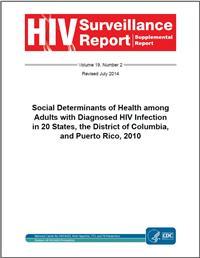Visit Website:
This report focuses on the social determinants of health (SDH) and its crossover to HIV rates in the United States. It explains that SDH refers to the overlapping social structures and economic systems that are responsible for most health inequities. Twelve tables break down rates of HIV diagnoses by indicators such as sex, age, area of residence, race, and transmission category. This report limits the data to adults older 18 and older to more accurately represent the population from which the SDH indicator variables were collected by the US Census Bureau’s American Community Survey (ACS). The numbers, percentages, and rates of diagnoses of HIV infection were based on data from the following areas: California (including Los Angeles County and San Francisco), Colorado, the District of Columbia, Georgia, Illinois (Chicago only), Iowa, Louisiana, Maryland, Michigan, Minnesota, Mississippi, Nevada, North Carolina, Oklahoma, Pennsylvania (including Philadelphia), Puerto Rico, South Carolina, Tennessee, Texas (including Houston), Virginia, Washington, and Wisconsin.
Format:
Report
Publication Date:
2014
ID:
35905
- Health Planners
- HIV and AIDS
- Black or African American persons
- Gay Men
- Hispanic or Latino persons


